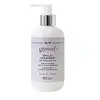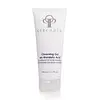What's inside
What's inside
 Key Ingredients
Key Ingredients

 Benefits
Benefits

 Concerns
Concerns

 Ingredients Side-by-side
Ingredients Side-by-side

Anthemis Nobilis Flower Extract
MaskingCamellia Sinensis Leaf Extract
AntimicrobialCaprylyl Glycol
EmollientCocamidopropyl Betaine
CleansingDecyl Glucoside
CleansingEthylhexylglycerin
Skin ConditioningGlycerin
HumectantHexylene Glycol
EmulsifyingMandelic Acid
AntimicrobialPanthenol
Skin ConditioningPentylene Glycol
Skin ConditioningPhenoxyethanol
PreservativePropanediol
SolventSymphytum Officinale Rhizome/Root Extract
Skin ConditioningTocopherol
AntioxidantSodium C14-16 Olefin Sulfonate
CleansingPEG-18 Glyceryl Oleate/Cocoate
EmulsifyingPEG-120 Methyl Glucose Dioleate
EmulsifyingAnthemis Nobilis Flower Extract, Camellia Sinensis Leaf Extract, Caprylyl Glycol, Cocamidopropyl Betaine, Decyl Glucoside, Ethylhexylglycerin, Glycerin, Hexylene Glycol, Mandelic Acid, Panthenol, Pentylene Glycol, Phenoxyethanol, Propanediol, Symphytum Officinale Rhizome/Root Extract, Tocopherol, Sodium C14-16 Olefin Sulfonate, PEG-18 Glyceryl Oleate/Cocoate, PEG-120 Methyl Glucose Dioleate
Water
Skin ConditioningSodium C14-16 Olefin Sulfonate
CleansingCocamidopropyl Betaine
CleansingMandelic Acid
AntimicrobialSodium Chloride
MaskingPanthenol
Skin ConditioningCaprylyl Glucoside
CleansingMaltodextrin
AbsorbentCamellia Sinensis Leaf Extract
AntimicrobialCaffeine
Skin ConditioningCitrus Limon Fruit Extract
MaskingLavandula Angustifolia Flower/Leaf/Stem Extract
MaskingCitrus Aurantium Bergamia Fruit Oil
MaskingMalus Domestica Fruit Extract
AntioxidantCitric Acid
BufferingVanilla Planifolia Fruit Extract
Skin ConditioningRosmarinus Officinalis Leaf Extract
AntimicrobialSalvia Officinalis Oil
MaskingRosmarinus Officinalis Leaf Oil
MaskingLavandula Hybrida Oil
EmollientSalvia Sclarea Oil
Masking1,2-Hexanediol
Skin ConditioningCaprylyl Glycol
EmollientPolysorbate 20
EmulsifyingSodium Hydroxide
BufferingWater, Sodium C14-16 Olefin Sulfonate, Cocamidopropyl Betaine, Mandelic Acid, Sodium Chloride, Panthenol, Caprylyl Glucoside, Maltodextrin, Camellia Sinensis Leaf Extract, Caffeine, Citrus Limon Fruit Extract, Lavandula Angustifolia Flower/Leaf/Stem Extract, Citrus Aurantium Bergamia Fruit Oil, Malus Domestica Fruit Extract, Citric Acid, Vanilla Planifolia Fruit Extract, Rosmarinus Officinalis Leaf Extract, Salvia Officinalis Oil, Rosmarinus Officinalis Leaf Oil, Lavandula Hybrida Oil, Salvia Sclarea Oil, 1,2-Hexanediol, Caprylyl Glycol, Polysorbate 20, Sodium Hydroxide
Ingredients Explained
These ingredients are found in both products.
Ingredients higher up in an ingredient list are typically present in a larger amount.
Camellia Sinensis Leaf Extract is derived from the leaves of the tea plant. Black tea, green tea, and oolong tea are all harvested from this plant.
This ingredient has many skin benefits:
This ingredient contains polyphenols, a strong antioxidant. Antioxidants help fight off molecules that damage skin cells.
On top of that, the antioxidants in green tea neutralize free-radicals from the sun. This gives the skin some extra UV protection, but should not replace sunscreen.
Many components of tea have anti-inflammatory properties.
Polyphenols and L-theanine help soothe the skin and reduce irritation. The caffeine in Camellia Sinensis Leaf Extract helps calm inflamed blood vessels.
Other compounds found in tea include: Vitamin Bs, linoleic acid, magnesium, calcium, iron, and zinc.
Research has shown both drinking Camellia Sinensis Leaf Tea and applying it to the skin can help boost skin elasticity and hydration. Studies also show using tea extract may reduce sebum, or oil, production.
Learn more about Camellia Sinensis Leaf ExtractCaprylyl Glycol is a humectant and emollient, meaning it attracts and preserves moisture.
It is a common ingredient in many products, especially those designed to hydrate skin. The primary benefits are retaining moisture, skin softening, and promoting a healthy skin barrier.
Though Caprylyl Glycol is an alcohol derived from fatty acids, it is not the kind that can dry out skin.
This ingredient is also used as a preservative to extend the life of products. It has slight antimicrobial properties.
Learn more about Caprylyl GlycolCocamidopropyl Betaine is a fatty acid created by mixing similar compounds in coconut oil and dimethylaminopropylamine, a compound with two amino groups.
This ingredient is a surfactant and cleanser. It helps gather the dirt, pollutants, and other impurities in your skin to be washed away. It also helps thicken a product and make the texture more creamy.
Being created from coconut oil means Cocamidopropyl Betaine is hydrating for the skin.
While Cocamidopropyl Betaine was believed to be an allergen, a study from 2012 disproved this. It found two compounds in unpure Cocamidopropyl Betaine to be the irritants: aminoamide and 3-dimethylaminopropylamine. High-grade and pure Cocamidopropyl Betaine did not induce allergic reactions during this study.
Learn more about Cocamidopropyl BetaineMandelic Acid is an alpha hydroxy acid (AHA).
Like other AHAs, it helps exfoliate the surface of the skin by breaking down the bonds that hold dead skin cells together. This helps reveal smoother and brighter skin underneath.
Mandelic acid helps with:
Due to it having a larger molecular size than glycolic acid, mandelic acid is able to penetrate the skin more slowly and evenly. This makes it gentler and less irritating, making it a great option for sensitive or beginner skin.
Despite being milder, mandelic acid is still an effective exfoliant that improves skin texture and tone over time.
What makes mandelic acid stand out from other AHAs? It has antibacterial and antioxidant properties.
These traits make it a great option for acne-prone or problem skin by reducing active breakouts and fading post-acne marks. Studies show that mandelic acid (especially when combined with salicylic acid) can significantly reduce pimples and hyperpigmentation while causing fewer side effects than stronger acids.
Mandelic acid is effective in concentrations of 5% and up with an ideal pH range of 3-4 for at-home use.
Like other AHAs, it’s important to wear sunscreen daily to protect your newly exfoliated skin.
However, unlike glycolic acid, mandelic acid is light-sensitive. Be sure your mandelic acid is packaged in opaque containers to ensure it stays stable and effective.
In short, mandelic acid is a gentle yet powerful AHA that exfoliates, brightens, and helps clarify skin while keeping irritation low. Its antibacterial action makes it especially beneficial for those with acne-prone, sensitive, or uneven skin, offering smoother, clearer, and more even-toned results over time.
Read more about some other popular AHA's here:
Learn more about Mandelic AcidPanthenol is a common ingredient that helps hydrate and soothe the skin. It is found naturally in our skin and hair.
There are two forms of panthenol: D and L.
D-panthenol is also known as dexpanthenol. Most cosmetics use dexpanthenol or a mixture of D and L-panthenol.
Panthenol is famous due to its ability to go deeper into the skin's layers. Using this ingredient has numerous pros (and no cons):
Like hyaluronic acid, panthenol is a humectant. Humectants are able to bind and hold large amounts of water to keep skin hydrated.
This ingredient works well for wound healing. It works by increasing tissue in the wound and helps close open wounds.
Once oxidized, panthenol converts to pantothenic acid. Panthothenic acid is found in all living cells.
This ingredient is also referred to as pro-vitamin B5.
Learn more about PanthenolSodium C14-16 Olefin Sulfonate is a cleansing agent made from a mixture of long chain sulfonate salts. It can also help produce foam.
This ingredient may be drying. We recommend speaking with a professional if you have concerns.